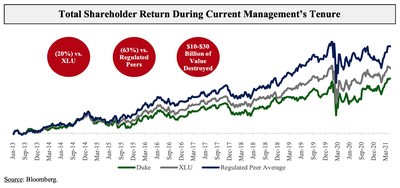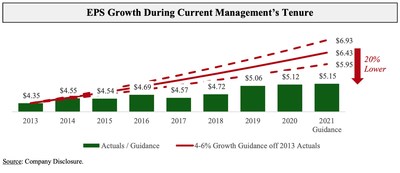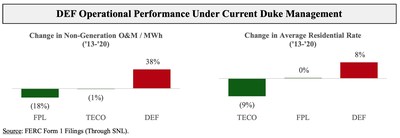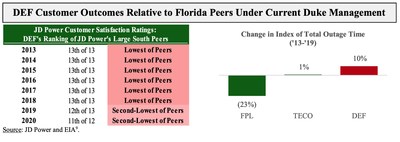Elliott Sends Letter to Duke Energy’s Board Highlighting Urgent Need for Significant Improvement
Elliott noted that it had received an outpouring of feedback from fellow investors, stakeholders, research analysts, current and former industry executives and top industry advisors. Based on that feedback, Elliott observed that Duke's poor track record has engendered deep skepticism regarding management's ability to create value for shareholders and deliver improved service for customers. Elliott also noted that Duke lacks effective independent oversight at the Board level and that the Company's "bigger is better" strategy is not aligned with the best interests of its shareholders or its customers.
Elliott detailed three specific areas of stakeholder feedback:
(1) Duke's poor track record of delivering on commitments has driven substantial underperformance and continued skepticism about management's ability to create value for shareholders.
(2) Duke can meaningfully improve operations and execution, and questions remain as to whether current Duke leadership is capable of maximizing the value of, and should continue to manage, its businesses outside of the core Carolinas footprint.
(3) Investors have significant doubts that the interests of Duke's management and Board are aligned with those of shareholders and other stakeholders, and they support Board-level reforms and a process to evaluate the best path forward.
Following from the consensus around these points, Elliott called on Duke to immediately address these concerns by:
i) enhancing the Board's independence;
ii) improving operational performance in
iii) increasing focus and enhancing value in
iv) attaining a premium valuation.
In light of investor skepticism that the same structure and leadership team that have presided over a long history of operational and stock-price underperformance are capable of delivering meaningfully better results in these key areas, Elliott concluded by calling on Duke to commit to specific improvements in these areas in the near term to allow Duke's key constituents to hold leadership accountable.
The letter can be downloaded at DukeRefocused.com.
Full text of the letter follows:
The Board of Directors
Duke Energy Corporation
Dear Members of the Board:
We are writing to you again on behalf of
Since making public our views on Duke on
These missteps — and the prolonged underperformance they have occasioned — have occurred under the oversight of the current management and Board. And the feedback we have received has expressed that while there is significant scope for improvement at Duke, the Company's history of inconsistent execution has engendered broad skepticism that Duke's current management team and Board can appropriately manage the Company's sprawling footprint and deliver long-term shareholder value consistent with the value of its businesses. In particular, Duke's under-management of its businesses in
The feedback we received falls into the following three categories:
(1) Duke's poor track record of delivering on commitments has driven substantial underperformance and continued skepticism about management's ability to create value for shareholders.
(2) Duke can meaningfully improve operations and execution, and questions remain as to whether current Duke leadership is capable of maximizing the value of, and should continue to manage, its businesses outside of the core Carolinas footprint.
(3) Investors have significant doubts that the interests of Duke's management and Board are aligned with those of shareholders and other stakeholders, and they support Board-level reforms and a process to evaluate the best path forward.
While our purpose today is not to counter each and every point of Duke's press release from
While we hope to re-establish a constructive dialogue, we believe that now is an appropriate time to publicly provide an update on our views and demand action from Duke's management and Board on the key issues identified by investors.
(1) Duke's poor track record of delivering on commitments has driven substantial underperformance and continued skepticism about management's ability to create value for shareholders.
Since the release of our letter, and the Company's response to it, the feedback we have received from those who follow Duke closely and care about its future has consistently reflected a lack of confidence in management's ability to execute. This inability to execute has had clear and direct consequences for Duke's financial performance and on its share price, leaving investors in Duke — including Duke's own employees, who own stock through their employee savings plans — significantly worse off than they would be had the Company executed at a higher level. Duke has generated anemic EPS growth and poor returns for shareholders as a result of avoidable operational, investment and strategic setbacks.
Under the leadership of the current management team, the Company has grown EPS by approximately 2% annually1 since 2013 despite guiding to 4% to 6% EPS growth over this period. Because of the Company's inability to execute, Duke's stock has underperformed the XLU by 20%2 and the regulated utility peer group ("Regulated Peers")3 by 63%. This performance ranks in the 36th percentile of the XLU and is second-worst among Regulated Peers.
This underperformance has translated into real consequences for shareholders — had Duke just performed in-line with these averages, it would have created
See "Total Shareholder Return During Current Management's Tenure" image.
See "EPS Growth During Current Management's Tenure" image.
One investor summarized the overhang from Duke's operational and strategic missteps as follows:
"On a no-names basis, if you lined this up relative to a company like Xcel, any value investor would obviously prefer Duke because the valuation is so much lower. If one thought that good execution was achievable by this management team, you could get to a much higher value. [But] they've grown earnings at 2% when they promised [4% to 6%] so that hasn't happened."
Notably, Duke's response to our
This 3% unaffected outperformance over 12 months after years of subpar returns and self-inflicted setbacks hardly supports Duke's claim that it is "performing at a high level." Nor does it signal a lack of opportunities for incremental value creation; to the contrary, our conversations with other investors and analysts have underscored a widespread belief that Duke's current business plan does not reflect the Company's full potential. However, instead of trying to understand the causes of the Company's poor long-term performance and examining all avenues to create sustainable value, current management and the Board have sought to defend and entrench themselves, arguing that their track record has actually been good and that the Company's performance is reaching an inflection point.
Unfortunately, investors have heard this story before. Duke's management team has repeatedly promised improved results in the past, and so far it has failed to deliver each time.
- 2013: "By resolving these issues, we have positioned Duke Energy as a low-risk, highly regulated utility operating in constructive regulatory environments. We have the financial strength and flexibility to consistently deliver on our commitments and grow the business."
- 2014: "These [financial] objectives [for 2014 and beyond] have remained consistent over time, and we have an established track record of achieving each of these objectives. We are on track to achieve our 2014 revised guidance range and our long-term adjusted earnings growth objective."
- 2015: "We have an established track record of achieving those [financial] objectives and have a strong plan in place to continue delivering attractive returns for our investors."
- 2016: "Our portfolio of businesses is well positioned to deliver strong, predictable earnings and cash flows to our investors."
- 2017: "We bring many advantages to this conversation, including scale, constructive jurisdictions, a track record of execution, and importantly, we are unencumbered by the challenges that we have successfully put behind us."
- 2018: "We are positioned to deliver results for both customers and shareholders and are confident in the plan we have for 2018 and beyond."
- 2019: "Our scale, constructive service areas and ability to execute make Duke Energy a solid long-term investment opportunity."
- 2020 (Before Reducing Guidance): "The Duke portfolio, in place since late 2016, has consistently performed well and is positioned for 2020 and beyond."
In light of these repeated, failed promises to do better, investors simply have no basis for believing that this time will be different.
(2) Duke can meaningfully improve operations and execution, and questions remain as to whether current Duke leadership is capable of maximizing the value of, and should continue to manage, its businesses outside of the core Carolinas footprint.
The share-price underperformance highlighted above is not happening for irrational or inexplicable reasons — rather, it reflects the market's skepticism of Duke's ability to execute. Our conversations with industry experts and highly respected current and former utility executives have supported the view that Duke's operations can be enhanced and Duke's portfolio should be further analyzed for opportunities to create value for shareholders and better position Duke to serve customers. The same strategies employed by Duke's high-performance peers in
Poor Execution at
Our benchmarking analysis of DEF against FPL and TECO reveals a cost structure that is 40% to 120% higher.6 This evidence directly contradicts Duke's claim that size and scale have benefited customers. The opportunity to materially improve Duke's operations in
"
Duke apparently does not believe that this subpar performance warrants further investigation or analysis and has justified DEF's status-quo underperformance with unsatisfactory excuses around why its operations are sufficiently "different" and should be exempt from benchmarking analyses. This is contradicted by
One example: A PSC report from
Meanwhile, as Duke's total costs and rates have increased significantly more than its peers, reliability has deteriorated and customer satisfaction has remained among the worst in the Southeast8 over the course of nearly a decade. This track record squarely belongs to Duke's current management team and Board, which to the best of our knowledge has made no effort to lay out a clear plan explaining how Duke plans to improve its costs, reliability and customer service in
See "DEF Operational Performance Under Current Duke Management" image.
See "DEF Customer Outcomes Relative to Florida Peers Under Current Duke Management" image.
Poor Execution at
In our
Alarmingly, at the
Persistent Issues in the Carolinas
Even in its core Carolinas jurisdictions, Duke's execution has been inconsistent. Under the current management team and Board, Duke was a key sponsor of the Atlantic Coast Pipeline. Duke pushed forward with the Atlantic Coast Pipeline ("ACP") for seven years, despite numerous delays and significant improvements in the cost competitiveness of renewables, ultimately resulting in a
Similarly, Duke's mismanagement of coal ash, which also occurred under the direction of the current management team and Board, resulted in the spilling of more than 39,000 tons of toxic coal ash into the
"I think the Carolinas used to be a premium jurisdiction, [but now] it's hard to invest there because of coal ash [and] the allowed ROE has gone from 10.5% to 9.5% over a number of years … They've taken that from a premium jurisdiction to an average jurisdiction."
Portfolio Questions
Questions surrounding the optimal go-forward portfolio for Duke have been intertwined with these views on the potential for operational improvements. As we have outlined above, management and the Board have consistently struggled to deliver value from the current large, sprawling, non-contiguous collection of businesses, which is continuing to drive concerns around Duke's ability to achieve consistent results over the long term. As one large Duke shareholder noted:
"I get your argument that if these utilities can be run better, which they can be run better, they would deserve premium multiples… They should review the asset mix [and] should do something about it. Right now it's really not optimal, so hopefully they get it."
During the course of our conversations with shareholders and other parties, we have heard a number of ideas around potential portfolio actions. While we suggested one course of action in our
(3) Investors have significant doubts that the interests of Duke's management and Board are aligned with those of shareholders and other stakeholders, and they support Board-level reforms and a process to evaluate the best path forward.
In addition to concerns about Duke's past performance and views that Duke's assets are undermanaged, several investors and other parties have expressed profound skepticism about the motives of Duke's management team and Board. In particular, there is concern that management and the Board's decisions are driven primarily by self-interest, with limited consideration of shareholders, customers and other stakeholders.
A selection of perspectives from these conversations is highlighted below:
"The reason they're big is to make sure that nobody like you bothers them or God forbid M&A that's not invited… They don't [care] about shareholders, they care about them[selves]." — Investor
"Certainly management credibility has been a frequent challenge point from [investors] and there have been a lot of concerns." — Research Analyst
"The management team is more concerned about pay when they talk about keeping it together than any other stakeholder of the utilities." — Former C-Level Utility Executive
"Size and scale with Duke benefit only one constituent, and that's the management team and the Board." — Former C-Level Utility Executive
We believe these views are primarily responding to excessive compensation relative to the Company's poor performance, lack of effective independent oversight and a perceived misalignment of interests between management and shareholders.
- Excessive Compensation: The key beneficiary of the Company's "bigger is better" strategy has been neither shareholders nor customers, but rather Duke's executive management team. Duke's CEO was paid
$14.5 million in 2020, which is among the highest in the utility sector and is approximately 116x the median compensation of Duke's employees. Given the clear relationship between executive compensation and company size (rather than total shareholder return) in the utility sector, Duke's management team has been a direct beneficiary of the Company's expansion — in fact, Duke justifies its executive compensation practices by looking to the compensation of executives at "similarly sized companies." Duke's pay for performance has received a "D" from Glass Lewis for the last two years, and an "F" for the three years before based on "the Company [paying] moderately more than its peers, but perform[ing] worse than its peers."
- Positive Reinforcement for Poor Outcomes: Duke has repeatedly rewarded poor outcomes with additional compensation and other perks for management. For example, after pleading guilty to criminal violations related to the
Dan River coal ash spill inMay 2015 and announcing the overpriced acquisition ofPiedmont Natural Gas inOctober 2015 , which resulted in more than$1 billion of day-one market cap destruction relative to a$4.9 billion purchase price, Duke awarded the CEO the previously independent chair title inDecember 2015 . In 2018, Duke disclosed a one-time$7 million retention grant for the CEO based on "her history of strong performance," despite the Company underperforming the XLU by 15% during her tenure9, cutting guidance twice over the prior three years and causing multiple large-scale environmental incidents (both theDan River incident and theOhio River oil spill, which occurred only six months later, where Duke spilled 9,000 gallons of diesel fuel into theOhio River and resulted in another guilty plea).
- Misalignment of Interests with Shareholders: Beyond Duke's excessive compensation and incentives that reward size over performance, the behavior of Duke's management team suggests a lack of alignment with investors. For example, after the CEO highlighted that "we begin the year with significant momentum on [the] strategic, regulatory and stakeholder fronts, and I'm very optimistic about the future heading into 2021" on
February 11 , she sold~$4 million of stock onFebruary 25 . As management promoted the value created under its status quo business plan after ourMay 17 letter, one of Duke's Board members and two C-suite executives sold stock onMay 19 andMay 20 .
- Lack of Effective Independent Oversight: Contrary to best governance practices, Duke does not have an independent chair. Furthermore, Duke's lead independent director has served on the
Board of Duke and its predecessors for more than 30 years, which the Company tried to conceal by changing its proxy disclosure starting in 2015. Duke's lead independent director has meaningfully exceeded Duke's recommended retirement age and tenure outlined in the Company's Principles for Corporate Governance, which has been justified for two years with vague claims that he is needed during a "time of transition for the Board to lend stability among the independent directors and to keep his long-term perspective as part of the mix of ideas." We struggle to understand how the lead independent director role could not be filled by a more qualified candidate that would hold Duke's management accountable. ISS expressed a similar view and observed that "given the company's recent performance, ongoing strategic transformation, and lengthy tenure of the current lead independent director, there is merit to the idea that the company and its shareholders could benefit from the strongest form of independent oversight with an independent chair." Approximately 35% of shareholders voted for the appointment of an independent chair at the most recent annual meeting.
Unfortunately, on top of all of the foregoing, Duke's dismissive and inaccurate responses to our
Next Steps
The feedback we have received has reinforced our conviction that there is clear support for new Board-level perspectives and a full business review. Shareholders want fresh perspectives in Duke's boardroom and a credible structure and process that arrives at the right path forward for Duke.
However, our conversations with management have revealed an unwillingness to establish an independent structure and process to evaluate potential improvements to Duke's business. Rather, Duke contends that its current strategy is working, and it asserts, as it has every year of this CEO's tenure, that sustainable improvement in its share-price performance is just around the corner. Hope — for investors having short term memory or inexhaustible patience — is not a strategy.
To be in a position to hold Duke accountable if it once again fails to deliver on this promise, Duke's shareholders deserve a detailed and credible plan to address investor concerns, enhance the Board's independence, improve operational execution and attain a premium valuation. In each of these areas, Duke must address the following specific concerns:
- Enhance the Board's Independence: Duke must address investor concerns over the independence of the Board, particularly in light of the long tenure of the lead independent director, and ideally by heeding the proposal submitted at this year's annual meeting that Duke require its Board chair to be an independent director. Additionally, the Board must acknowledge and address the fact that despite nearly 40% of the value of Duke residing outside of the Carolinas, Duke's Board currently has no directors with credible public policy experience in or ties to
Florida orIndiana .
- Improve Florida Operational Performance: Duke must provide updated targets and commitments for
Duke Energy Florida that reflect the full operational and investment opportunity in that jurisdiction, and explain whyDuke Energy Florida's ratepayers should accept lower-quality service than peers at higher prices.
- Increase Focus and Enhance Value in
Indiana : Duke must accelerate growth inIndiana to enhance the value ofDuke Energy Indiana . Alternatively, Duke should justify why the Company's strategy of utilizingDuke Energy Indiana as a source of cash flow to fund other jurisdictions is optimal for shareholders, as opposed to investing in the state, and why Duke'sIndiana ratepayers should be funding investments that benefit constituents in other states.
- Attain a Premium Valuation: Given the universal view that Duke's underlying franchises in the Carolinas,
Florida and the Midwest are among the highest quality in the utility industry, Duke must show investors how it intends to close its valuation gap to other utility holding companies with comparably favorable jurisdictions, growth rates and fleet transition opportunities.
As one of Duke's largest investors, we remain skeptical that the same structure and leadership team that have presided over a long history of operational and stock price underperformance are capable of delivering meaningfully better results in the areas above. Duke's assertions to the contrary will continue to ring hollow in the absence of specific commitments to which it can be held accountable. We look forward to seeing the Company's specific solutions to the issues raised above.
In the meantime, as long as Duke remains unwilling to address these issues in the manner that its stakeholders deserve, we intend to continue sharing our thoughts and perspectives on the Company's performance, fostering an active debate over the right path forward for Duke, and holding the Company accountable if it fails to improve.
Sincerely,
|
|
|
1 Represents the EPS growth rate from 2013 to 2021 based on the midpoint of Duke's 2021 EPS guidance.
2 Unless otherwise noted, all return calculations are as of
3 Regulated utility peer group includes SO, D, AEP, XEL, WEC, ES, AEE, CMS, EVRG, and LNT.
4 Based on JEA's residential rate comparison data. Assumes monthly average residential electric consumption of 1,108 kWh consistent with the statewide average per EIA data.
5 As measured by
6 Based on 2019 non-generation O&M/MWh.
7 "Review of Electric IOU Transmission Structure Inspection and Maintenance Procedures and Processes" by the
8 Based on
9 Based on TSR through
Media Contact:
Stephen Spruiell
Elliott Investment Management L.P.
(212) 478-2017
[email protected]
View original content to download multimedia:https://www.prnewswire.com/news-releases/elliott-sends-letter-to-duke-energys-board-highlighting-urgent-need-for-significant-improvement-301336367.html
SOURCE








U.S. Senate Candidate Khaled Salem Tells Congress ‘There is a New Sheriff in Town – Enough Healthcare Fraud’
Medical Tubing Market To Reach USD 13770 Million By 2026 at a CAGR of 7.2% – Valuates Reports
Advisor News
- Regulator group aims for reinsurance asset testing guideline by June
- Bessent confirmed as Treasury secretary
Former hedge fund guru to oversee Trump's tax cuts, deregulation and trade changes
- Jackson National study: vast underestimate of health care, LTC costs for retirement
- EDITORIAL: Home insurance, tax increases harm county’s housing options
- Nationwide Financial Services President John Carter to retire at year end
More Advisor NewsAnnuity News
Health/Employee Benefits News
- Peter Daniel: Government mandates are driving up healthcare costs in NC
- NC bill would limit insurers' prior authorizations
- Plan to tax employer-provided insurance would harm lower-income Hoosiers
- 'Floridians need to pay attention.' Are we prepared for federal cuts to our health care?
- New New York state tax credit for small businesses introduced
More Health/Employee Benefits NewsLife Insurance News
- Legals for January, 31 2025
- Automatic Shelf Registration Statement (Form S-3ASR)
- Best’s Special Report: Impairments in US Life/Health Insurance Industry Jump to 10 in 2023
- AM Best Maintains Under Review With Developing Implications Status for Credit Ratings of Solidarity Bahrain B.S.C.
- AM Best Maintains Under Review With Developing Implications Status for Credit Ratings of First Insurance Company
More Life Insurance News